On May 25, Olorato Mongale, a 30-year-old woman from South Africa, went on a date with a man she had recently met.
Less than two hours later, she was dead.
Her half-naked body was found by the roadside in Lombardy West, a suburb north of Johannesburg. It showed signs of severe trauma and bruising. Investigators concluded that she had been murdered elsewhere and dumped at the scene.
Her brutal and senseless killing led to a wave of grief and outrage on social media. Days later, a family spokesperson revealed that Mongale – a master’s student at the University of the Witwatersrand – had once worked as a journalist. She left the profession seven years ago due to the emotional toll of reporting on gender-based violence and femicide (GBVF).
Her family said Mongale had grown increasingly anxious about her own vulnerability to male violence. In particular, the 2017 murder of 22-year-old Karabo Mokoena haunted her. Mokoena was stabbed to death by her ex-boyfriend, Sandile Mantsoe, who then burned her body beyond recognition and buried the remains in open grassland in Lyndhurst – a suburb just kilometres from where Mongale’s body was found.
Despite her conscious efforts to avoid Mokoena’s fate, Mongale ultimately became what she had feared most: another name added to the long and growing list of South African women murdered by men.
At her funeral on June 1, her mother, Keabetswe Mongale, said her daughter had tried desperately to fight off her attacker.
“When I saw her at the government mortuary, I could see that my daughter fought. She fought until her nails broke,” she said.
Her devastating death serves as a stark reminder that women and girls across South Africa continue to face an existential threat from gender-based violence, despite years of government promises and reforms.
On May 24, 2024, President Cyril Ramaphosa signed into law a bill establishing the National Council on Gender-Based Violence and Femicide. The body is mandated to provide leadership and coordination in the fight against GBVF. While it appeared to be a step forward, it did not represent a transformative policy shift.
This is not the first such initiative. In 2012, then-Deputy President Kgalema Motlanthe launched the National Council Against Gender-Based Violence, with a similar mandate to coordinate national anti-GBV efforts.
More than a decade later, with yet another council in place, GBVF crimes continue.
In November 2023, the Human Sciences Research Council (HSRC) of South Africa released the country’s first national study on GBVF. It found that the persistence of gender-based violence is rooted in “deeply ingrained societal norms and structures that perpetuate male dominance and reinforce gender hierarchies … leading to female subordination, systemic inequalities, and violence against women”.
The destructive effect of entrenched patriarchy is undeniable. In South Africa, a woman is murdered every three hours. That is approximately 8 women a day. One study estimates that around 7.8 million women in the country have experienced physical or sexual violence.
While women of all races and backgrounds are affected, Black women face higher rates of GBVF – an enduring legacy of apartheid and its structural inequalities.
This crisis is not unique to South Africa. The terror faced by women and girls is a continent-wide phenomenon.
In November 2024, the United Nations published its report Femicides in 2023: Global Estimates of Intimate Partner/Family Member Femicides, revealing that Africa had the world’s highest rate of partner-related femicide that year.
Kenya stands out for its staggering figures.
Between September 2023 and December 2024, the country recorded more than 7,100 cases of sexual and gender-based violence. These included the murders of at least 100 women by male acquaintances, relatives, or intimate partners in just four months.
Among the victims was Rebecca Cheptegei, a Ugandan Olympian and mother of two, who competed in the marathon at the 2024 Paris Games. On September 5, 2024, she died in Eldoret, Kenya, from severe burns after her former partner doused her in petrol and set her alight during a domestic dispute. He himself later died in a hospital from his injuries.
The Kenyan government later recognised GBVF as the most pressing security challenge facing the country — a belated but crucial move.
On May 26, Kenya’s National Gender and Equality Commission noted that the surge in GBVF crimes was driven by “a complex interplay of cultural, social, economic, and legal factors”. Patriarchal traditions continue to fuel inequality and legitimise violence, while harmful practices such as forced marriage, female genital mutilation (FGM), and dowry-related violence further endanger women’s lives. Economic hardship and women’s financial dependence only deepen their vulnerability.
Across the continent, we are witnessing a dangerous resurgence of archaic patriarchal norms.
The COVID-19 lockdowns in 2020 further exposed the scale of the crisis. Since then, countless behavioural change campaigns have been launched, but they have largely failed.
This is no surprise.
According to Afrobarometer data from November 2023, nearly 48 percent of all Africans believe domestic violence is a private matter, not a criminal offence.
The uncomfortable truth is that many African men, regardless of education or economic status, do not prioritise the safety or rights of women and girls.
On International Women’s Day last year, South African rugby captain Siya Kolisi said it plainly: “Men are not doing enough.”
Indeed, many continue to uphold harmful customs such as child marriage and remain disengaged from efforts to protect women. Years of empty rhetoric have led to a growing body count.
It is time for African men to take full ownership of this crisis and commit to radical change.
They must reject cultural practices and ideals of manhood that dehumanise women. African cultures are not unchangeable, and patriarchy is not destiny. A new, egalitarian model of African masculinity must be nurtured — one based on dignity, equality, and nonviolence.
This cultural reorientation must begin in families and be sustained through schools, religious and traditional forums, and community life.
It must happen for Olarato Mongale. For Rebecca Cheptegei. For the thousands of others whose lives were stolen.
And most urgently, it must happen for the women and girls across Africa who live each day knowing that their greatest threat may come from the men closest to them.
There can be no just African future unless African manhood is transformed.








